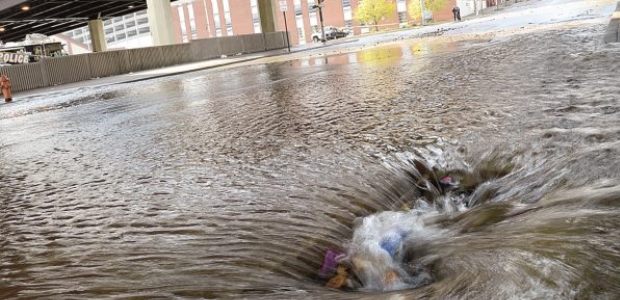
Agreement Reached to Reduce Baltimore Sewage Overflows
The new proposed agreement calls for mandatory stream quality monitoring for pollutants, including pathogens, with results posted quarterly, and greater transparency, with draft plans posted to the city's website and made available 45 days before they are due to interested parties.
The Maryland Department of the Environment and its federal partners have reached an agreement with the city of Baltimore to greatly reduce the amount of sewage that overflows in the city within four years. The agreement is a proposed modification to the 2002 consent decree between DEP, EPA, the U.S. Department of Justice, and the city; the modification would set deadlines for completion of an estimated $2.5 billion in work by the city to improve its sewer system.
Their agreement, announced by DEP on Sept. 9, notes modeling shows more than 80 percent of sewage overflow volume will be addressed by projects to be completed by the start of 2021.
"Our administration was proud to work with our federal partners, Baltimore City, and the environmental community to come together on this critical water quality and public health priority," said Maryland Gov. Larry Hogan. "This agreement will protect local waters and the Chesapeake Bay and support critical water infrastructure in a way that provides a real, sustainable return on taxpayer investment."
The proposed amended consent decree was filed a federal court in Baltimore. It requires court approval.
Key modifications to the 2016 proposed agreement include these:
- Additional focus on backups of sewage into homes and other buildings, including required reports on their location, identification of areas with recurring backups, and establishment of a cleanup reimbursement program that will help property owners remove sewage and disinfect areas quickly and safely.
- A specific list of projects to be completed by January 2021, including a $430 million "headworks" project to eliminate a flow restriction at the Back River wastewater treatment plant that causes sewage backups into buildings and leads to intentional, "structured" overflows at two locations. For this project, Maryland's Water Quality Revolving Loan Fund program has allocated low-interest financing of $156 million to Baltimore City and $151.7 million to Baltimore County for the county's share of the costs.
- Mandatory stream quality monitoring for pollutants, including pathogens, with results posted quarterly.
- Greater transparency, with draft plans, including a revised Emergency Response Plan, posted to the city's website and made available 45 days before they are due to interested parties, who will then have 30 days to comment.
- Additional stipulated penalties, including penalties for any failure to develop and implement a plan to address sewage discharges from unknown origins.
"This is a better contract for clean water and environmental justice," said Maryland Environment Secretary Ben Grumbles. "The state will ensure the City keeps its promise, providing tough oversight and real money to support continued progress for all citizens of the Chesapeake Bay region."
According to DEP, Baltimore has completed many of the actions required by the original 2002 consent decree, including that Baltimore City paid a $600,000 civil penalty for violations alleged in the 2002 decree and has paid about $1.8 million in stipulated penalties for overflows as prescribed in the decree.